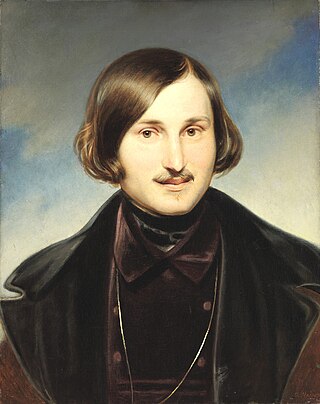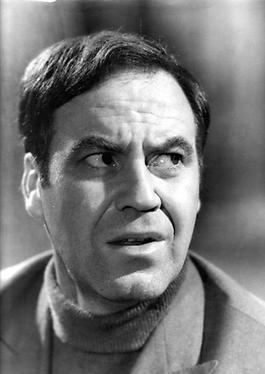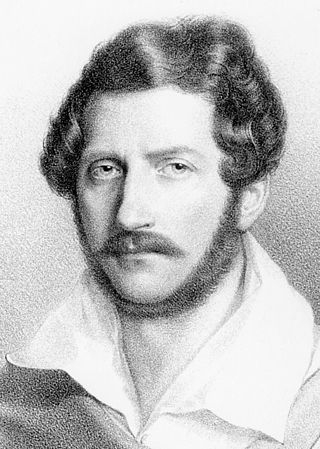Related Research Articles

Nikolai Vasilyevich Gogol was a Russian novelist, short story writer and playwright of Ukrainian origin.
Diary of a Madman may refer to:

The Nose, Op. 15,, is Dmitri Shostakovich's first opera, a satirical work completed in 1928 based on Nikolai Gogol's 1836 story of the same name.
Humphrey Searle was an English composer and writer on music. His music combines aspects of late Romanticism and modernist serialism, particularly reminiscent of his primary influences, Franz Liszt, Arnold Schoenberg and Anton Webern, who was briefly his teacher. As a writer on music, Searle published texts on numerous topics; he was an authority on the music of Franz Liszt, and created the initial cataloguing system for his works.
"Diary of a Madman" is a farcical short story by Nikolai Gogol. Along with "The Overcoat" and "The Nose", "Diary of a Madman" is considered to be one of Gogol's greatest short stories. The tale centers on the life of a minor civil servant during the era of Nicholas I. The story shows the descent of the protagonist, Poprishchin, into insanity. "Diary of a Madman", the only one of Gogol's works written in first person, follows diary-entry format.

The Fair at Sorochyntsi is a comic opera in three acts by Modest Mussorgsky, composed between 1874 and 1880 in St. Petersburg, Russia. The composer wrote the libretto, which is based on Nikolai Gogol's short story of the same name, from his early (1832) collection of Ukrainian stories Evenings on a Farm near Dikanka. The opera remained unfinished and unperformed at Mussorgsky's death in 1881. Today, the completion by Vissarion Shebalin has become the standard.

Werner Egk, born Werner Joseph Mayer, was a German composer.

L'Africaine is an 1865 French grand opéra in five acts with music by Giacomo Meyerbeer and a libretto by Eugène Scribe. Meyerbeer and Scribe began working on the opera in 1837, using the title L'Africaine, but around 1852 changed the plot to portray fictitious events in the life of the Portuguese explorer Vasco da Gama and introduced the working title Vasco de Gama, the French version of his name. The copying of the full score was completed the day before Meyerbeer died in 1864.
Chamber opera is a designation for operas written to be performed with a chamber ensemble rather than a full orchestra. Early 20th-century operas of this type include Paul Hindemith's Cardillac (1926). Earlier small-scale operas such as Pergolesi's La serva padrona (1733) are sometimes known as chamber operas.

This is a list of the works by Nikolai Gogol (1809–1852), followed by a list of adaptations of his works:
Guo Wenjing is a Chinese composer and educator.
Zygmunt Krauze is a Polish composer of contemporary classical music, educator, and pianist.
This is a summary of 1958 in music in the United Kingdom, including the official charts from that year.

Weiße Rose is a chamber opera in one act by Udo Zimmermann. The opera tells the story of Hans and Sophie Scholl, a brother and sister in their early twenties, who were guillotined by the Nazis in 1943 for leading Die Weiße Rose, a non-violent resistance group. The opera premiered at the Dresden Conservatory on 17 June 1967 with a German libretto by the composer's brother, Ingo Zimmermann, a well known journalist and writer in Germany. The opera was received fairly well. Zimmermann revised it the following year for a professional production in Schwerin.
John Musto is an American composer and pianist. As a composer, he is active in opera, orchestral and chamber music, song, vocal ensemble, and solo piano works. As a pianist, he performs frequently as a soloist, alone and with orchestra, as a chamber musician, and with singers.

Theo Altmeyer was a German classical tenor. Although he was a successful opera singer, he is chiefly remembered for his work as an oratorio soloist. He possessed a rich and lyrical voice that he employed with great expression and nuance.

Il furioso all'isola di San Domingo(The Madman on the Island of San Domingo) is a "romantic melodramma" in two acts by the composer Gaetano Donizetti. Jacopo Ferretti, who since 1821 had written five libretti for Donizetti and two for Rossini, had proposed the unusual subject and he was contracted to write the Italian libretto based on a five-act play of the same title by an unknown author in 1820, which "had been given in the same theatre [...] and which Donizetti had immediately loved". However, as has been noted by Charles Osborne, the "ultimate derivation of both play and libretto is an episode in part 1 of Don Quixote by Miguel de Cervantes's published in 1605" which is the story of Cardenio and Lucinda.
William Somervell Mann was an English music critic. Born in India, he was educated at Winchester and Cambridge, studying music with several prominent composers, before taking up a career as a critic.
Wolf Cub Village is a 1994 Chinese-language chamber opera in four scenes by Guo Wenjing to a libretto by Zeng Li after Lu Xun's story "Diary of a Madman".
Michaël Lévinas is a French composer and pianist.
References
- Notes
- 1 2 Searle (1982), Chapter 13. Accessed 18 December 2016.
- ↑ Searle (1958), pp. (ii)- (iv), p. 55.
- ↑ Searle (1958), p. (iii)
- ↑ Searle (1958), pp. 1-6.
- ↑ Searle (1958), pp. 6-17.
- ↑ Searle (1958), pp. 17-34.
- ↑ Searle (1958), pp. 34-43.
- ↑ Searle (1958), pp. 43-55.
- ↑ Searle (1982) Chapter 16, accessed 18 December 2016.
- Sources
- Searle, Humphrey (1958). The Diary of a Madman. London and Mainz: Schott and Co.
- Searle, Humphrey (1982), Quadrille with a Raven. MusicWeb International website, accessed 18 December 2016.